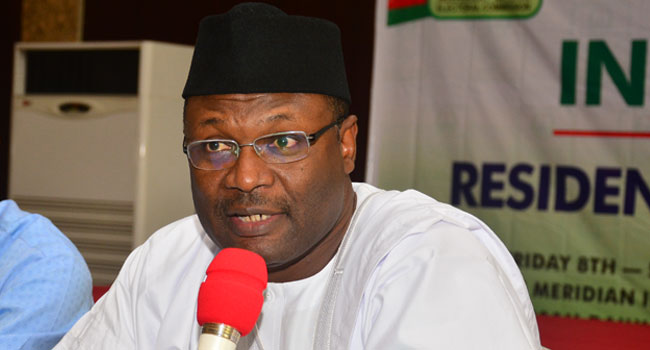The Independent National Electoral Commission (INEC) has again advised the 74 deregistered political parties in the country to await the judgement of the Supreme Court on appeals relating to the powers of the Commission to deregister political parties in accordance with section 225A of the Constitution.
The Commission said in a statement signed by the National Commissioner & Chairman of Voter Education and Publicity Committee, Festus Okoye, that it will continue to recognise and deal with only 18 political.
INEC in the statement however said that it is always ready to obey Court orders and will abide by any judgement delivered by the Supreme Court.
The statement reads below:
This statement has become necessary against the backdrop of various letters submitted to the Commission recently by some of the deregistered political parties signifying their intention to conduct primaries with a view to submitting names and particulars of candidates for the Anambra Governorship election.
The deregistered parties hinge their request to nominate candidates on the judgement of the Court of Appeal delivered on June 11, 2020.
The Commission will continue to recognize and deal with only the 18 registered political parties pending the final resolution and determination of the various appeals filed and pending before the Supreme Court. Consequently, INEC will not monitor any purported primaries by any of the deregistered political parties and will not issue access code to or accept the list and particulars of candidates emanating from such primaries.
It would be recalled that on August 10, 2020, the Commission issued a statement affirming that the judgement of the Court of Appeal delivered in favour of the 22 deregistered political parties is in conflict with the judgement delivered by the same Court in the case of National Unity Party (NUP) vs. INEC wherein the Court affirmed the powers of the Commission to deregister NUP and other political parties.
The National Unity Party has appealed against the said judgment to the Supreme Court of Nigeria and the case is presently pending in that Court. The appeal as well as the one filed by the Commission against the judgment of the Court of Appeal relating to the 22 deregistered parties are pending in the Supreme Court.
Considering the conflict between the two judgements, the Commission counselled that “It is in the interest of the electoral process for both matters to be consolidated. The electoral process will be better served through a final resolution of the issues in the deregistration of political parties. It will also enable the commission to stand on firm grounds rather than pick and choose which between two conflicting decisions it should obey,”
Meanwhile, the registered political parties are reminded to strictly adhere to the provisions of their constitutions on internal party administration and nomination of candidates for elections. This has become necessary in view of the recent spate of complains regarding the dissolution of the Executives of State branches even where their tenures have not expired as well as the rash of conflicting court orders with respect to party primaries and candidature long after elections have been conducted by the Commission. Respect for party Constitution and due process are cardinal to electoral democracy. Political parties are hereby reminded of their obligations to internal democracy and the rule of law.
The Commission uses this opportunity to appeal to all critical stakeholders to support its efforts to strengthen the electoral process. These efforts presently include but are not limited to the initiative to expand access of voters to Polling Units; resumption of the Continuous Voters Registration; amendment of the Electoral Legal Framework; preparations for the conduct of the Anambra, Ekiti and Osun Governorship elections and some bye-elections; the deepening of the use of technology in the electoral process as well as early preparations for 2023 General Election.













